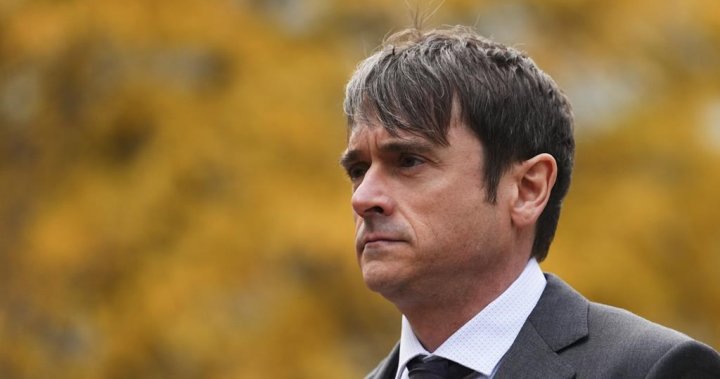There was “no limit” to the amount of classified intelligence that a former senior RCMP analyst had access to during the time when he was accused of leaking secrets, a jury heard last week.
The first in a series of censored transcripts of Cameron Ortis’ testimony was released Thursday night, a week after the former RCMP intelligence operative took the stand in his own defence during the unprecedented trial.
Ortis, 51, is accused of attempting to sell classified secrets to targets of international criminal investigations. He has pleaded not guilty and his defence lawyers have argued that not only did Ortis have the authority to do what he did, he had a “duty to act.”
The first transcript begins to sketch out that defence. While many of the facts of the case are not in dispute, the transcript provides the first public view into Ortis’ perspective on his alleged actions.
Ortis had access to “all” criminal intelligence at the RCMP
Ortis was the civilian director of the RCMP’s Operation Research Branch, a group mandated to analyze intelligence from Canadian agencies and close security partners to identify national security and criminal threats.
From the stand, Ortis told the jury that he had complete access to the RCMP’s collective intelligence files, including information from Five Eyes security partners.
“In theory, we had access to all of the criminal holdings within the RCMP, and we also had the ability to do open-source research to supplement that,” Ortis told the jury.
“And we also had the mandate to make contact with RCMP partners in order to share information with them, so that they would share information back with us.”
Ortis testified that at the time he was developing the Operation Research Branch’s role, the RCMP was sharing little of that intelligence with its security partners.
The use of intelligence in criminal investigations is complicated, and agencies are loathe to disclose their methods or sources in open court, Ortis said. The purpose of Operations Research was to come up with ways to use intelligence without directly influencing criminal investigations.
“It wasn’t a matter of simply hiding information. It was a (matter) of coming up with business rules, procedures, protocols … for Operations Research that would allow us to work with that information but not let it be disclosed or influence the way an on-the-ground criminal investigation was running.”
Ex-RCMP head gave “approval” for intelligence unit
One of the names that has repeatedly come up during Ortis’ testimony is Bob Paulson, the former RCMP commissioner who retired in 2017.
Paulson has denied “protecting” Ortis, but multiple sources told Global News in 2020 that the former commissioner was instrumental in the accused leaker’s rise through the national police force.
Ortis’ testimony suggests that Paulson was central during the development of the Operations Research Branch.
“He would have been responsible for any intelligence that was being collected and produced by the RCMP on the national security mandate,” Ortis told the jury, referring to Paulson’s former role as the assistant commissioner for national security investigations.
Ortis’ defence suggested that while he was working on threats to critical infrastructure, he took on “extra duties” related to a “particular counterterrorism threat” involving another country and a terrorist organization.
Ortis testified that he was reporting to Paulson on the file and Supt. Larry Tremblay, who Ortis said tasked him with the counterterrorism file.
Project “Skyfall”
The first time Ortis started using “high-side” or classified intelligence was during an investigation dubbed “Skyfall,” which began in 2011. It was a year before a James Bond movie of the same name was released, but the testimony did not explore any connection.
The investigation was into money laundering that Ortis said was “threatening the integrity and the fabric” of Canada’s financial system. It included both money laundering and the use of encrypted BlackBerry phones.
“I saw some unique reporting during the ordinary course of (intelligence) triage that explained, described and outlined a threat to Canada and the banking system,” Ortis told the court.
“An extraordinary amount of money that was being laundered through Canada and its closest partners … And the nexus or the big piece of that threat as I read it was here in Canada and operating in Canada.”
Ortis suggested the money laundering was connected to actors tied to Iran, which at the time was under significant international sanctions, and that he briefed Paulson directly on the issue. Ortis testified that he left that meeting with the understanding the top brass wanted his unit to continue work on the file.
He also testified that the government at the time, under Prime Minister Stephen Harper, made “Skyfall” a priority for the Canadian intelligence community.
“It’s been devastating”
Ortis’ testimony is the first time he’s been able to publicly describe the impact his arrest in 2019 has had on him, calling it “devastating.”
He told the jury that he has no pension, no possessions and that his reputation has been “completely destroyed.”
“Family stood by me. Friends did not,” Ortis said. “Friends from the old days in British Columbia who I’ve known for a long time have stood by me, but friends and colleagues in Ottawa and professional contacts have not.”
Ortis testified on Nov. 2, 3 and 6, with more transcripts from his testimony expected to be released in the coming days. His trial resumes on Nov. 14.
© 2023 Global News, a division of Corus Entertainment Inc.




